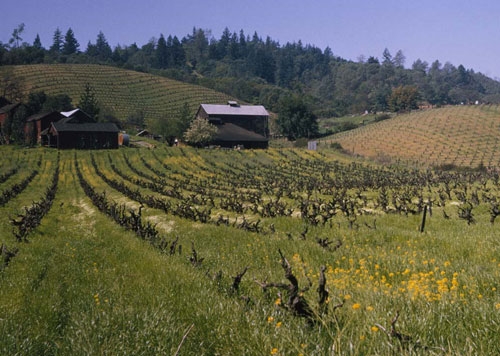Posts Tagged: Monica Cooper
UCCE teaching the next generation of farmers
Students accepted into a new farming and ranching education program being offered by UC Cooperative Extension in Sonoma County and other institutions will have their first of nine monthly meetings March 30, wrote Michael Shufro in the Santa Rosa Press Democrat.
“We recognize that the current population of farmers is aging, and that we need to get our younger farmers prepared and ranching,” said Stephanie Larson, UC Cooperative Extension advisor in Sonoma County and director of the new training program. “We’re really hoping to not only get more farmers and ranchers trained, but to increase food access and food production in Sonoma County, and also to teach more people about where their food comes from.”
Students in the program will split their time between classwork with ag teachers, field work with local farmers and business plan development with small business experts. The program will expand to include the broader farming community, connecting students with restaurants and grocers that buy local produce and the slew of farmers’ markets around the county.
“Programs like this strengthen the parts we already have and bring farmers together,” Larson said. “We used to work mainly in silos, but we’ve been breaking those silos down, and finding it works much better together than separately.”
Another blessing for Napa
Paul Franson, Napa Valley Register
On top of wine, food, arts and culture that some large cities might envy, Napa Valley has an invaluable, little-recognized asset: an uncommonly cooperative and educated wine industry.
Local food blazing a trail on Napa County map
Responding to Napa County's higher-than-average interest in healthy foods, sustainable principles and wellness lifestyle, the board of supervisors last year created a Local Food Advisory Council. Now the council is looking for citizen input to pursue new initiatives, according to a blog on the Napa County Register website.
Monica Cooper, director of the Napa County University of California Cooperative Extension, is an ex-officio member of the council. Cooper is the county’s viticulture farm advisor and a big champion of expanding local food production, according to a previous article in the newspaper.
“It’s important to have more crop diversity,” Cooper was quoted in the story, and she sees that in small plots, not wide swaths of the county.
Napa's Local Food Advisory Council has identified three priority areas and is seeking volunteers to serve on subcommittees for:
- Education and Outreach: Help design communications networks to encourage public involvement and information sharing, such as advocacy programs, printed materials, events, website, social media, etc.
- Local Food Production and Distribution: Help develop mutually beneficial food supply systems linking local farmers to community kitchens, markets and residents;
- Food Policy: Help influence and communicate county rules, regulations and fees for growing, selling and/or donating food products by both home and commercial producers.

Napa's soil, climate, natural resources and culture position the community to make a positive impact promoting locally grown food and healthful consumption.
Farm advisor helps keep Napa County agriculture safe and strong
Napa County UC Cooperative Extension viticulture advisor Monica Cooper is critical to the local agricultural industry, but her role is not well understood by the public, according to a profile in the Napa Valley Register.
Cooper took the post two years ago, following the untimely death of her predecessor Ed Weber.
“Monica could not have arrived at a more important time for Napa’s winegrape industry,” the story quoted Jennifer Putnam, executive director of the Napa Valley Grapegrowers Association. “We were incredibly fortunate to have such an accomplished entomologist in the role just as the European grapevine moth infestation was being discovered. She, along with our ag commissioner and others, quickly developed and acted on a plan to control the spread of this devastating pest. Her sense of urgency and expertise were critical in our ability to get a handle on that outbreak.”
Cooper has a doctorate degree in plant medicine from the University of Florida, where she also studied entomology, plant pathology, weed and soil science, agronomy and horticulture, the article said.
“I think Monica has (been) a tremendous asset for the valley,” Whitmer was quoted. “I feel bad that right out of the gate she had to deal with the European grapevine month, but she’s been a tremendous help in providing the science to help fight it.”
A former Peace Corps volunteer, Cooper got her start at UC in the Berkeley laboratory of biological control specialist Kent Daane.
Cooper told reporter Paul Franson she is happy with her job in Napa.
"I love working in an agricultural county,” Cooper was quoted. “The variety of work is most interesting, too. You never know what will happen and I could never sit in an office all day. I love working with growers. They’re always thirsty for information.”
Many UC academics heeded Kennedy's call to 'serve the cause of peace'
When President John F. Kennedy created the Peace Corps in 1961, he not only sent thousands of Americans to serve the cause of peace in the developing world, he set them on a course of service that continued when they returned to the U.S. A significant number came to work for UC Cooperative Extension.
One of them is Jim Grieshop, a now-retired UCCE community education development specialist, who was profiled in an article in the February issue of Alaska Airlines Magazine marking the Peace Corps' 50th anniversary.
Acceptance into the Peace Corps helped Grieshop achieve his personal goal of living and working in Latin America, the article said. In May 1964, he arrived in Cayambe, Ecuador, to spend two years as a science teacher. He quickly learned to be flexible.
"The science teacher in the village didn't really want me to teach science," Grieshop was quoted in the story. "So I taught English in primary schools and the high school . . . . We put on a rodeo, we did some summer programs - I was kind of making it up as I went along."
Here are some of the other UCCE academics, past and present, who served in the Peace Corps:
Monica Cooper, viticulture farm advisor in Napa County, volunteered in an agrarian community in Panama.
Jeff Dahlberg, director of the UC Kearney Agriculture Research and Extension Center, served for three years in the Republic of Niger.
Chris Dewees, retired specialist in Cooperative Extension marine fisheries, volunteered in Chile.
Morgan Doran, livestock and natural resources farm advisor in Solano County, volunteered in Ecuador.
Ben Faber, Ventura County farm advisor, served in Togo, Africa.
Mark Gaskell, small farm advisor in San Luis Obispo County, served in Venezuela.
Juan Guerrero, retired farm advisor emeritus for Riverside and Imperial counties, worked with subsistence farmers and large-scale commercial farmers in Paraguay and Peru.
Glenda Humiston, vice president, UC Agriculture and Natural Resources, served in Tunisia, North Africa.
Susan Laughlin, retired regional director, spent three years in Colombia.
David Lewis, watershed management advisor in Marin County, volunteered in Niger.
Mike Marzolla, retired 4-H advisor in Ventura County, coordinated a school and community garden program in Guatemala.
Richard Molinar, retired small-scale farm advisor for Fresno County, served in Honduras.
Jeff Mitchell, cropping systems specialist, UC Kearney Agricultural Research and Extension Center, served in Botswana, Africa.
Rachel Surls, UCCE sustainable food systems advisor in Los Angeles County, served in Honduras.
Jack Williams, the retired Sutter/Yuba county director, worked alongside farmers in Kenya, Africa.
Ken Wilmarth, former 4-H advisor in Stanislaus County, and his wife, Jenny, spent two years in Chavin, Peru.
Have I missed any UCCE Peace Corps volunteers? Please post a comment letting me know.

President Kennedy greets Peace Corps volunteers in 1961. (Photo: Wikimedia Commons.)
Biodynamic farming moves toward mainstream
Nearly 200 growers, vintners, retailers, sommeliers and other tradespeople attended a workshop on biodynamic winemaking Dec. 2, prompting San Francisco Examiner wine blogger Annette Hanami to suggest the process is becoming mainstream.
"Ultimately, biodynamic wines are becoming mainstream because consumers demand it," the author wrote. "Biodynamic products are becoming less 'kooky' and more attractive than the scarier mass-produced alternatives."
UC Cooperative Extension teamed up with Demeter USA to offer the biodynamic program and UC farm advisors Glenn McGourty and Monica Cooper were presenters.
Biodynamic farming is a method of organic production that the involves the use of fermented herbal and mineral "preparations" as compost additives and field sprays, and the use of an astronomical sowing and planting calendar.
With stores like Walmart now selling organic produce and products made with organic ingredients, being “sustainable” and “green” are no longer enough to distinguish a producer in a competitive global market, Hamini wrote.
Currently, there are 75 California wine producers who are certified biodynamic or in transition; the growth rate is 15 percent per year.



